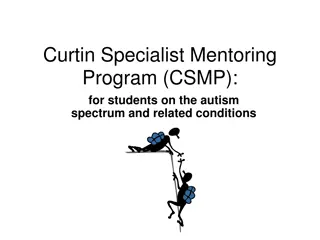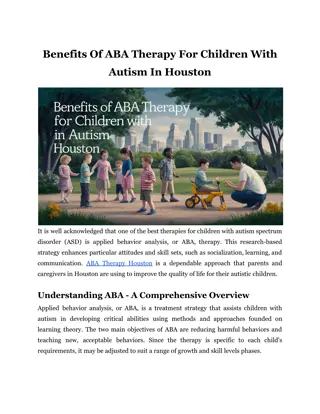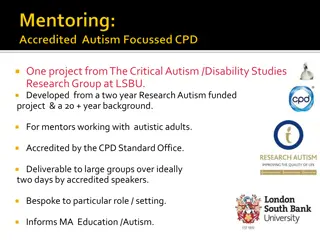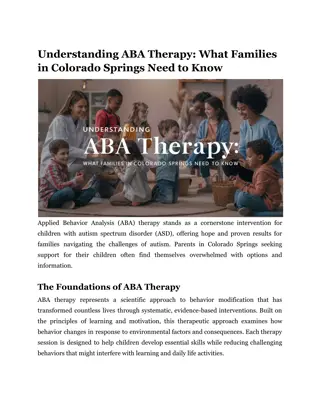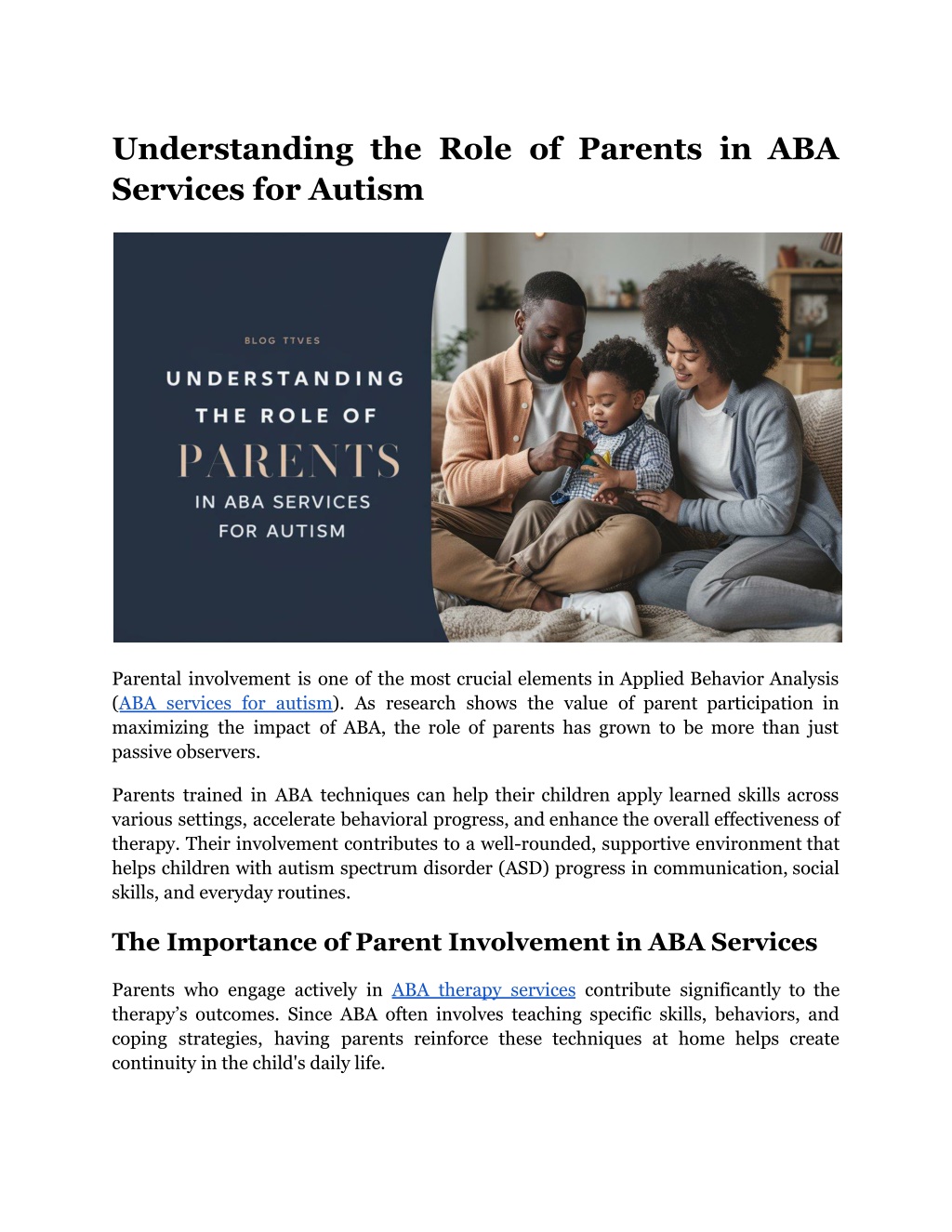
Understanding the Role of Parents in ABA Services for Autism
Explore how parents can support their childu2019s progress in ABA therapy and strengthen outcomes for autism treatment.n
Download Presentation

Please find below an Image/Link to download the presentation.
The content on the website is provided AS IS for your information and personal use only. It may not be sold, licensed, or shared on other websites without obtaining consent from the author. Download presentation by click this link. If you encounter any issues during the download, it is possible that the publisher has removed the file from their server.
E N D
Presentation Transcript
Understanding the Role of Parents in ABA Services for Autism Parental involvement is one of the most crucial elements in Applied Behavior Analysis (ABA services for autism). As research shows the value of parent participation in maximizing the impact of ABA, the role of parents has grown to be more than just passive observers. Parents trained in ABA techniques can help their children apply learned skills across various settings, accelerate behavioral progress, and enhance the overall effectiveness of therapy. Their involvement contributes to a well-rounded, supportive environment that helps children with autism spectrum disorder (ASD) progress in communication, social skills, and everyday routines. The Importance of Parent Involvement in ABA Services Parents who engage actively in ABA therapy services contribute significantly to the therapy s outcomes. Since ABA often involves teaching specific skills, behaviors, and coping strategies, having parents reinforce these techniques at home helps create continuity in the child's daily life.
Benefits of Parent Involvement: Generalization of Skills: Parents help children apply ABA skills in real-world settings, reinforcing behavior across different environments, like home and community spaces. Increased Therapy Time: Parents implementing ABA services at home boost the total intervention hours, accelerating skill acquisition. Consistency: Parent training enables caregivers to use ABA techniques, ensuring the child experiences consistency across various settings. Long-Term Progress: When parents reinforce ABA at home, it ensures that learned skills are maintained, fostering long-term benefits and behavioral improvement. Parent Training in ABA Therapy One of the most effective ways to support parent involvement is through structured training in ABA principles. Parent training programs equip families with the tools needed to understand, reinforce, and generalize the behaviors and skills taught in therapy. Understanding ABA Techniques: Parents learn the methods and rationale behind ABA techniques, such as positive reinforcement, to manage their child's behaviors effectively. Reinforcing Positive Behaviors: Training teaches parents to recognize and encourage positive behaviors, which is fundamental to promoting lasting behavioral change. Managing Challenging Behaviors: Parents are equipped with techniques to manage problematic behaviors constructively, ensuring consistency in their responses. Tracking Progress: Training in data collection allows parents to monitor their child s behavior and share valuable insights with therapists. Integrating ABA into Routines: Parents learn how to incorporate ABA techniques into everyday activities, enhancing the natural learning opportunities at home. Benefits of Parent Involvement in ABA Therapy The advantages of parental involvement extend beyond the therapy sessions, creating positive outcomes for both children and families.
Enhanced Family Dynamics: ABA parent training can improve the parent-child relationship, creating a more harmonious family atmosphere. Reduced Stress for Parents: When parents feel confident in their ability to manage challenging behaviors, they often experience reduced stress. Individualized Approach: With training, parents can adjust interventions to better meet their child s unique needs, creating a customized experience. Cost-Effectiveness: Parents delivering ABA techniques at home may reduce the need for additional professional hours. Improved Communication: Through parent training, families often find ways to communicate more effectively, which strengthens their overall bond. Implementing Parent Involvement in ABA Therapy Incorporating parent involvement typically follows a structured approach that addresses each family s needs. Initial Assessment: The therapist evaluates the child s needs and the family environment to create a personalized approach. Customized Training: Based on the assessment, the therapist tailors the training to address specific family goals and challenges. Hands-on Guidance: Parents receive practical training, often through role-playing exercises and guided practice with their child. Ongoing Support: Regular feedback helps parents refine their techniques and receive updated guidance from their ABA therapists. Participation in Sessions: Parents are encouraged to observe and join therapy sessions, which allows them to reinforce what they learn and understand their child s progress. Challenges of Parent Involvement and Strategies to Overcome Them While parent involvement in ABA therapy has many benefits, it can also present some challenges that families need to address. Time Constraints: Parents may struggle to balance therapy involvement with work, family, and other responsibilities. Scheduling flexibility and prioritizing ABA activities in daily routines can help. Learning Curve: Some parents find ABA techniques difficult to learn. Continued practice, coupled with therapist support, can gradually build confidence and skill.
Emotional Stress: Facing a childs challenges can be emotionally taxing. Support groups and counseling can encourage parents and coping mechanisms. Cultural Considerations: ABA methods may need to be adapted to fit cultural values and family dynamics. Open communication with the therapist ensures culturally sensitive, effective strategies. Wrapping Up Parent involvement in ABA services for autism amplifies the effectiveness of therapy by creating a home environment where learned skills can flourish. Children benefit from the structured support of parents who are engaged and trained, leading to more consistent progress and better generalization of skills. For parents, being actively involved in their child s therapy fosters a sense of accomplishment and reduces stress, as they are empowered to positively impact their child s growth. At Illuminate ABA Therapy, we believe parents are powerful partners in creating meaningful change. Our ABA therapy services are designed not only to support children but also to equip parents with the tools and confidence to reinforce progress at home. With personalized guidance, we re here to make a lasting difference for your family. Site Article: Understanding the Role of Parents in ABA Services for Autism











